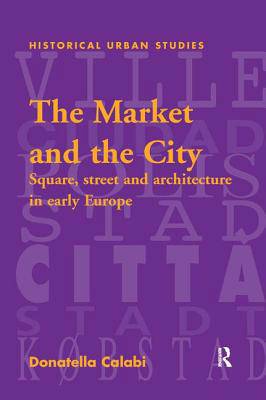
- Afhalen na 1 uur in een winkel met voorraad
- Gratis thuislevering in België vanaf € 30
- Ruim aanbod met 7 miljoen producten
- Afhalen na 1 uur in een winkel met voorraad
- Gratis thuislevering in België vanaf € 30
- Ruim aanbod met 7 miljoen producten
Zoeken
€ 77,45
+ 154 punten
Uitvoering
Omschrijving
The early modern period is often characterised as a time that witnessed the rise of a new and powerful merchant class across Europe. From Italy and Spain in the south, to the Low Countries and England in the north, men of business and trade came to play an increasingly pivotal role in the culture, politics and economies of western Europe. This book takes a comparative approach to the effect such merchants and traders had on the urban history of market places - streets, squares and civic buildings - in some of the great commercial European cities between the fifteenth and seventeenth centuries. It looks at how this in period, the transformations of designated commercial areas were important enough to modify relationships throughout the entire urban context. Market places tend to be very ancient, continuing to function for centuries on the same location; but between the middle of the fourteenth and the first decades of the seventeenth, their structures began to change as new regulations and patterns of manufacture, distribution and consumption began to install a new uniformity and geometry on the market place. During the period covered by this study, most major European cities undertook the rebuilding of entire zones, constructing new buildings, demolishing existing structures and embellishing others. This book analyses the intentions of innovation, in parallel with sanitary and hygienic reasons, the juridical regulations of the architecture of certain building types and the urban strategies as efficient tools to better control the economic activities within the city.
Specificaties
Betrokkenen
- Auteur(s):
- Uitgeverij:
Inhoud
- Aantal bladzijden:
- 332
- Taal:
- Engels
- Reeks:
Eigenschappen
- Productcode (EAN):
- 9781138251038
- Verschijningsdatum:
- 2/09/2016
- Uitvoering:
- Paperback
- Formaat:
- Trade paperback (VS)
- Afmetingen:
- 156 mm x 233 mm
- Gewicht:
- 452 g

Alleen bij Standaard Boekhandel
+ 154 punten op je klantenkaart van Standaard Boekhandel
Beoordelingen
We publiceren alleen reviews die voldoen aan de voorwaarden voor reviews. Bekijk onze voorwaarden voor reviews.











